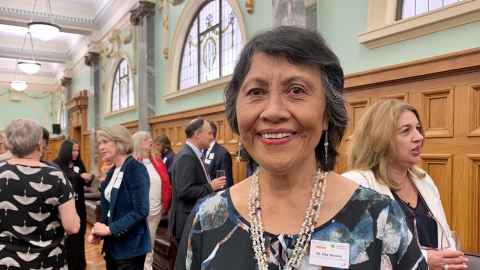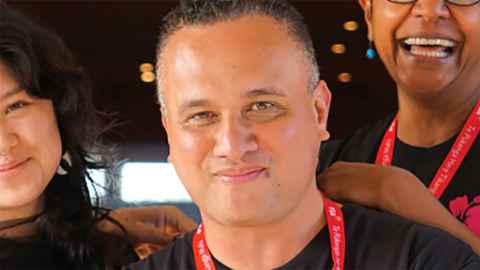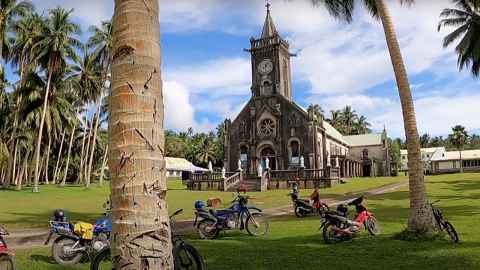From Siria to Aotearoa: honouring Rotuman language and legacy
11 May 2025
Aotearoa's Pacific Language weeks launch with the start of Gasav Ne Fäeag Rotuạm Ta – Rotuma Language Week, 11 to 17 May.

It’s Rotuma Language Week, with the theme: Åf'ạkia ma rak'ạkia 'os fäega ma ag fak Rotuma – tēfakhanisit Gagaja nā se ‘äe ma gou – Treasure and Teach Our Rotuman Language and Culture – A Gift Given to You and Me by God.
Lying almost 650 kilometres north-northwest of Fiji, Rotuma, a group of volcanic islands, has been a political dependency of Fiji since 1881. It was first known as Siria, the star which lies exactly above its location. Rotuma is said to enjoy a spiritual connection to the star Siria.
Despite its small population of around 2,000, many of its descendants continue to have a big impact on the world at large. Rotumans living abroad still identify strongly with the island; Rotuma Day, celebrated globally by the diaspora on 13 May, honours their heritage.
The University of Auckland’s Dr Ofa Dewes MNZM is a Senior Research Fellow at the Centre of Methods and Policy Application in the Social Sciences (COMPASS) and is also part of the diaspora in Aotearoa New Zealand, numbering just under 1,000. She also represents Papatoetoe as a member of the Ōtara-Papatoetoe Local Board.
Dr Dewes was born and raised in Suva, Fiji, and is part-Rotuman, Tongan, and Tuvaluan, with affiliation to Ngāti Porou. She was appointed a Member of the New Zealand Order of Merit in 2023 for services to health and the Pacific community.
Her doctoral research in health science investigated the risk factors for obesity among Pacific high school students aged 13–18 years, and the role of the church in obesity prevention.
Dewes is recognised for working with collaborative, transdisciplinary, and multidisciplinary research teams, and for applying both qualitative and quantitative research skills, as well as Pacific health models, in the various projects she has led.
Better health and well-being outcomes for Pacific peoples, and service to the community, are a strong focus of her work as she continues to pursue other research opportunities in the humanities and medical and health sciences.

Commitment to language preservation
Duane Leo is focused on preserving Rotuman identity through language and tradition.
The University of Auckland alumnus also wants to revitalise the Rotuman language. As the national secretary for the New Zealand Public Service Association, Leo visited Rotuma in 2023 with extended family members – a trip that deepened his connection to his heritage.
“I am the eldest le’e (child) of Basil Mosese Pasirio Leo, from the village of Motusa in the district of I’tutliu, Rotuma,” he says.
“Being Rotuman is part of my identity – it forms the foundation that shapes my worldview and connects me to my family, history, culture, religion, and language.”
Leo is intentional about passing on this cultural legacy to the next generation. He says there are many ways he works to sustain the Rotuman language and traditions, especially for his children.
“This includes giving my children kaunohoga (family) names and taking them back home to experience a mamasa ceremony.”
The mamasa is a traditional “welcoming home” ceremony that dates back to the time of Leo’s Rotuman ancestors, who would spend long days at sea fishing. Today, it remains a powerful symbol of return, belonging and cultural continuity.
Rotuman – a unique language
The Rotuman language is unlike Fijian and is more closely related to other Polynesian languages. Sharing cultural and linguistic similarities with neighbouring Pacific islands like Tahiti, Tonga, Uvea, and Futuna, its geographical isolation has helped contribute to Rotuma’s distinctive language.
Linguists have long been fascinated with Rotuman, particularly its ten vowels: A, Ä, Å, Ḁ, E, I, Ö, O, Ü, and U. Along with the macron, the five basic vowels and their five variations produce sounds not found in any other Pacific language.

Fun facts
Although Rotuma is politically part of Fiji, its people are ethnically and culturally Polynesian.
Rotuma is a volcanic island, which contributes to its lush landscape and fertile soil. This makes it ideal for growing taro, yams, and bananas – staples of the local diet.
Rotuma was thought to have been first settled by people from Tahiti Nui, the Marquesas, and Rapa Nui.
First known as Siria, this is the star that lies directly above the location of Rotuma.
In its earliest days, oral histories point to Rotuma being used as a royal burial ground for the kings and queens of Tahiti Nui and Rapa Nui.
Rotumans living in New Zealand (981) actively practise their language and share knowledge to pass on to future generations.
Birds: Rotuma is included in the Important Bird and Biodiversity Areas (IBAs), helping protect vulnerable birds such as the Rotuma Myzomela, Polynesian Starling, and Fiji Shrikebill.
Ancient Navigators: Rotuma served as a transit point during the era of ancient Pacific voyaging.